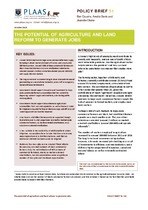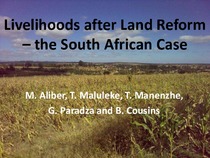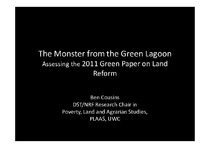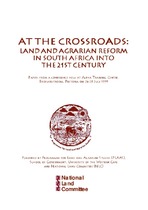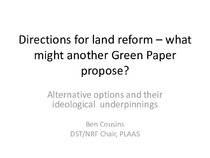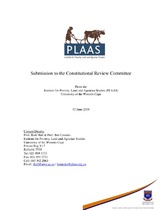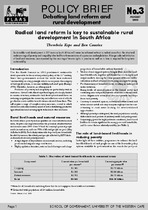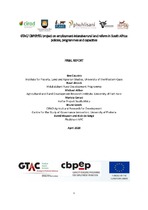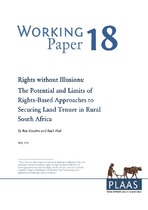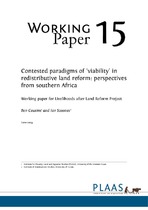Search
Now showing items 1-10 of 16
The potential of agriculture and land reform to generate jobs
(Institute for Poverty, Land and Agrarian Studies, University of the Western Cape, 2018)
Extremely high levels of unemployment contribute to poverty and inequality, and are one of South Africa’s most intractable problems. Can the agricultural sector help to address the problem? And how can land reform be ...
Livelihoods after land reform: The South African case
(Institute for Poverty Land and Agrarian Studies (PLAAS), 2012)
SA’s land reform regarded as a failure
– economic objectives – the spectre of ‘failed projects’
– changing the racial pattern of land ownership – too slow
• No consensus as to why, or what to do
• Even so, ambitious ...
The Monster from the Green Lagoon Assessing the 2011 Green Paper on Land Reform
(2011)
Background
• Consensus across the board that LR is in deep trouble and unlikely to meet targets
• Some argue that food security is of rising concern, given rising food prices (here and globally)
• Minister Nkwinti: ...
At the crossroads: Land and agrarian reform in South Africa into the 21st century
(Institute for Poverty, Land and Agrarian Studies, University of the Western Cape, 1999)
The land sector has always been characterised by
lively and public arguments over policy, and some of
the central and recurring themes of the previous five
years of debate were expected to surface at the
conference. ...
Directions for land reform – what might another Green Paper propose? Alternative options and their ideological underpinnings
(2012)
International and SA debates: 4 broad approaches & loose coalitions
• “Modernist-conservative”/modernisation: support the existing structure of agriculture (capital intensive farming in large units) but deracialise LSCF ...
Submission to the Constitutional Review Committee
(Institute for Poverty Land and Agrarian Studies (PLAAS), 2018)
Radical land reform is key to sustainable rural development in South Africa
(Institute for Poverty, Land and Agrarian Studies, University of the Western Cape, 2002)
Sustainable rural development in 21st century South Africa will never be achieved without a radical assault on the structural
underpinnings of poverty and inequality inherited from three centuries of oppression and ...
Final Report
(GTAC, 2020-03-31)
This study focuses on the potential contribution of redistributive land reform to employment creation. Can land redistribution be undertaken in a manner that also creates jobs, and if so, through which types of land use ...
Rights without illusions: The potential and limits of rights-based approaches to securing land tenure in rural South Africa
(Institute for Poverty, Land and Agrarian Studies, University of the Western Cape, 2011-05)
Summarising the trajectory of tenure policy and law making from 1994 through to the present, the paper shows how discourses of rights, citizenship and democracy shape policies and legislation. We assess the policies and ...
Contested paradigms of ‘viability’ in redistributive land reform: perspectives from southern Africa
(Institute for Poverty, Land and Agrarian Studies, University of the Western Cape, 2009-06)
‘Viability’ is a key term in debates about land reform in southern African and beyond, and is used in relation to both individual projects and programmes. ‘Viability’ connotes ‘successful’ and ‘sustainable’ - but what is ...

